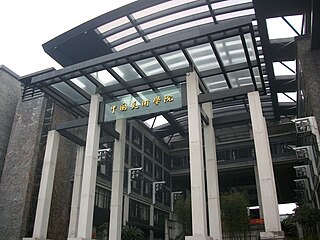
China Academy of Art, also translated as China National Academy of Fine Arts, was founded in Hangzhou in 1928 by the government of the Republic of China and the renowned educator Cai Yuanpei. It was the first art university and first graduate school in Chinese history. In 2016, the Academy had been approved to be jointly-administrated by Zhejiang Provincial Government, the Ministry of Education, and the Ministry of Culture. It is a Chinese state Double First Class University Plan university.
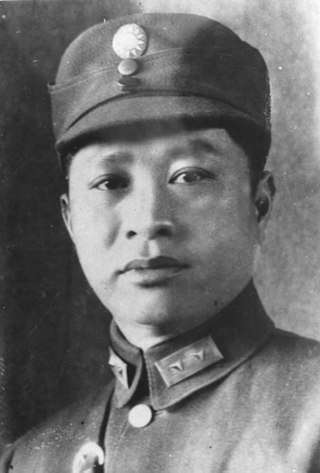
Ye Ting, born in Huiyang, Guangdong, was a Chinese military leader who played a key role in the Northern Expedition to reunify China after the 1911 Revolution. After serving with the Kuomintang, Ye later joined the Communist Party of China (CPC).
Ankang is a name shared by a number of psychiatric hospitals or asylums in China. The term literally means "peace and health [for the mentally ill]". Many of these institutions are prison-hospitals for holding prisoners judged to be mentally ill, and operate directly under the local Public Security Bureau. As a result, "ankang" is sometimes used in the Western press to denote the system of prison-hospitals in China. However, not all ankang hospitals are prison-hospitals, and some offer conventional psychiatric and medical treatment services.
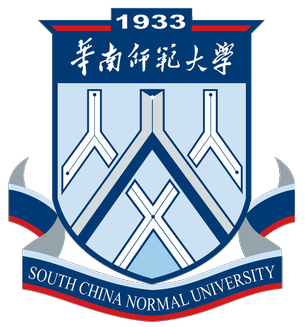
South China Normal University is a comprehensive university that is part of Double First Class University Plan and Project 211 in Guangzhou, capital of Guangdong province, in the People's Republic of China. It is a Chinese state Double First Class University identified by the Ministry of Education. The university is featured distinctively by both teaching and research, consisting of diverse branches of learning such as philosophy, economics, law, education, literature, history, science, technology, and management. There is also an elementary school in this university.
Chen-Yuan Lee, was a Taiwanese pharmacologist and political activist. He is famous for his research on snake venom. He was a recipient of the prestigious Redi Award from the International Society on Toxinology (IST), and was also a former president of the society. He was a former dean of the National Taiwan University College of Medicine. After his retirement from researching, he focused on participating in the Taiwan independence movement and many democratic movement. Lee had founded many political organizations such as the "100 Action Union" (100行動聯盟), Foundation of Medical Professionals Alliance in Taiwan. He was also the first chairperson of the Taiwan Independence Party.
Wuyi University is a public university based in Jiangmen, Guangdong, China.
Wuhan Sports University, formerly translated as Wuhan Institute of Physical Education, (WIPE), is a tertiary educational institution in China. According to the statistics released by the Ministry of Education of China, the university is one of the four leading universities in the physical education area in China. The university has many world-famous alumni, such as gymnast Cheng Fei, who won more than 19 gold medals including an Olympic one. And this can be better illustrated during Beijing 2008 Olympic Games, when WIPE alumni alone won 6 gold medals, 2 silver medals and 3 bronze medals.
Guo Zhengtang is a Chinese geologist specialized in the Cenozoic.
Wenying Zhuang is a Chinese mycologist. She is known for her contributions to the study of species diversity and phylogeny of Ascomycetes.

Guangzhou No.2 High School is a Chinese public high school in Guangzhou, Guangdong. The school was established in August, 1930.
An Zhisheng is a Chinese geographer and politician who specializes in quaternary geology, air particle pollution control, and global change. He is internationally known for his studies on Chinese loess and its implication for paleo-climate and paleo-environment changes. He is a member of the Chinese Academy of Sciences and The World Academy of Sciences (TWAS), and Foreign Associate of the National Academy of Sciences. He is a researcher and doctoral supervisor of the Institute of Earth Environment, Chinese Academy of Sciences. He is a member of the Communist Party of China. He is an editor of Quaternary Science Reviews. He served as the Vice Chairman of International Union for Quaternary Research (INQUA) from 1999 to 2007, and the Vice Chair of International Geosphere-Biosphere Programme (IGBP) steering committee from 2003 to 2006.
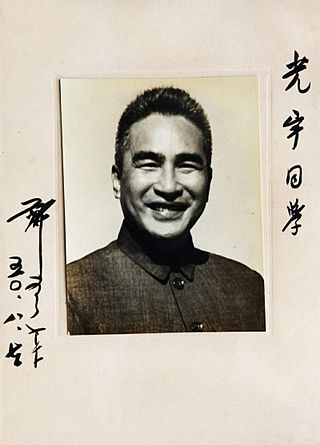
Zheng Yanfen was a Chinese-born politician affiliated with the Kuomintang. He worked with the League of Nations and supported the Nationalist government. After the government of the Republic of China moved to Taiwan, Zheng led the Overseas Chinese Affairs Commission, was the Minister of Justice, and served as Secretary-General to the President.
Meng Wei is a former Chinese politician and environmentalist who served as president of the Chinese Research Academy of Environmental Sciences from 2001 to 2016. As of November 2017 he was under investigation by the Communist Party's anti-corruption agency. He was an academician of the Chinese Academy of Engineering. He was a deputy to the 11th and 12th National People's Congress. He was the first notable figure implicated in corruption following the 19th National Congress of the Chinese Communist Party on October 24, 2017. He is the third academician of the Chinese Academy of Engineering whose title has been revoked in the past two years, after Li Ning and Zhou Guotai. Meng Wei has been stripped of his post and party membership on April 4, 2018.
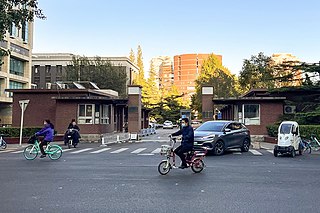
The Institute of Physicsof the Chinese Academy of Sciences was the result of a merger, after the communist took control of the mainland China in 1949, between the Institute of Physics of Academia Sinica (IOPAS) founded in Shanghai in 1928 and the Institute of Physics of National Academy of Peiping (IOPNAP) founded in Beiping in 1929. The director of the IOPNAP, physicist Yan Jici, was appointed director of the new institution after the merger was completed in 1950. The new entity was named the Institute of Applied Physics before being renamed to Institute of Physics in 1958. In Taiwan, the IOPAS was re-established in Taipei in 1962 by another "founding father" of modern Chinese physics - Wu Ta-You.
Chen Xu is a Chinese geologist who is a researcher at the Nanjing Institute of Geology and Paleontology, and an academician of the Chinese Academy of Sciences.
Liang Dongcai is a Chinese molecular biophysicist, politician, and an academician of the Chinese Academy of Sciences.
Xin Zhou is a Chinese scientist specializing in magnetic resonance imaging. He is currently serving as president of the Innovation Academy for Precision Measurement Science and Technology of the Chinese Academy of Sciences since July 2022.
The School of Life Sciences, Lanzhou University was established in 1999.
Yang Weicai a Chinese plant molecular geneticist, and academician of the Chinese Academy of Sciences, currently director and researcher of the Institute of Genetics and Developmental Biology, Chinese Academy of Sciences, and vice chairman of the Chinese Genetics Society.





